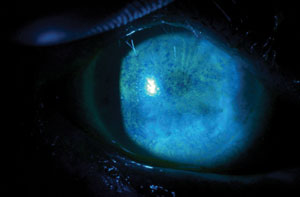 |
| In this study, Sjögren’s syndrome patients had bacterial species changes including decreased Shannon alpha diversity and observed operational taxonomic units. Photo: Ben Gaddie, OD. Click image to enlarge. |
Sjögren’s syndrome patients’ gut health has important implications for the ocular surface. Using metagenomic sequencing, researchers were able to identify differential bacterial species from stool samples. Their findings, presented today at the 2022 ARVO meeting in Denver, confirmed that the Sjögren’s syndrome gut microbiome is less diverse and associated with increased ocular disease severity.
The study included 20 healthy subjects as well as four patients with dry eye and seven with Sjögren’s syndrome (age-matched, all female). The researchers used the International Dry Eye Workshop guidelines to score ocular disease severity and prepared high-quality DNA for metagenomic sequencing and analysis from the collected stool samples.
They reported significantly decreased Shannon alpha diversity and observed operational taxonomic units in Sjögren’s syndrome patients. The observed operational taxonomic units were inversely correlated with ocular severity score. Interestingly, the researchers found a significant difference between the healthy and Sjögren’s syndrome groups but not between the healthy and dry eye groups.
Organisms in the Bacteroidetes and Actinobacteria phyla contributed most to community differences, the researchers noted in their abstract. At the species level, Sjögren’s syndrome patients stood out with significantly more Bacteroides caecimuris, Mediterranea massiliensis, Bacteroides coprophilus and Clostridium_sp_7_3_54FAA. These patients also had significantly less Bifidobacterium bifidum, a beneficial probiotic bacterial species commonly found in mammals, compared with healthy controls.
The researchers concluded that these species changes correlated with disease severity.
Schaefer L, Midani F, Trujillo-Vargas C, et la. Metagenomic sequencing of Sjögren syndrome and healthy gut microbiota reveals differential bacterial species that correlate with disease severity. ARVO 2022 annual meeting. |

